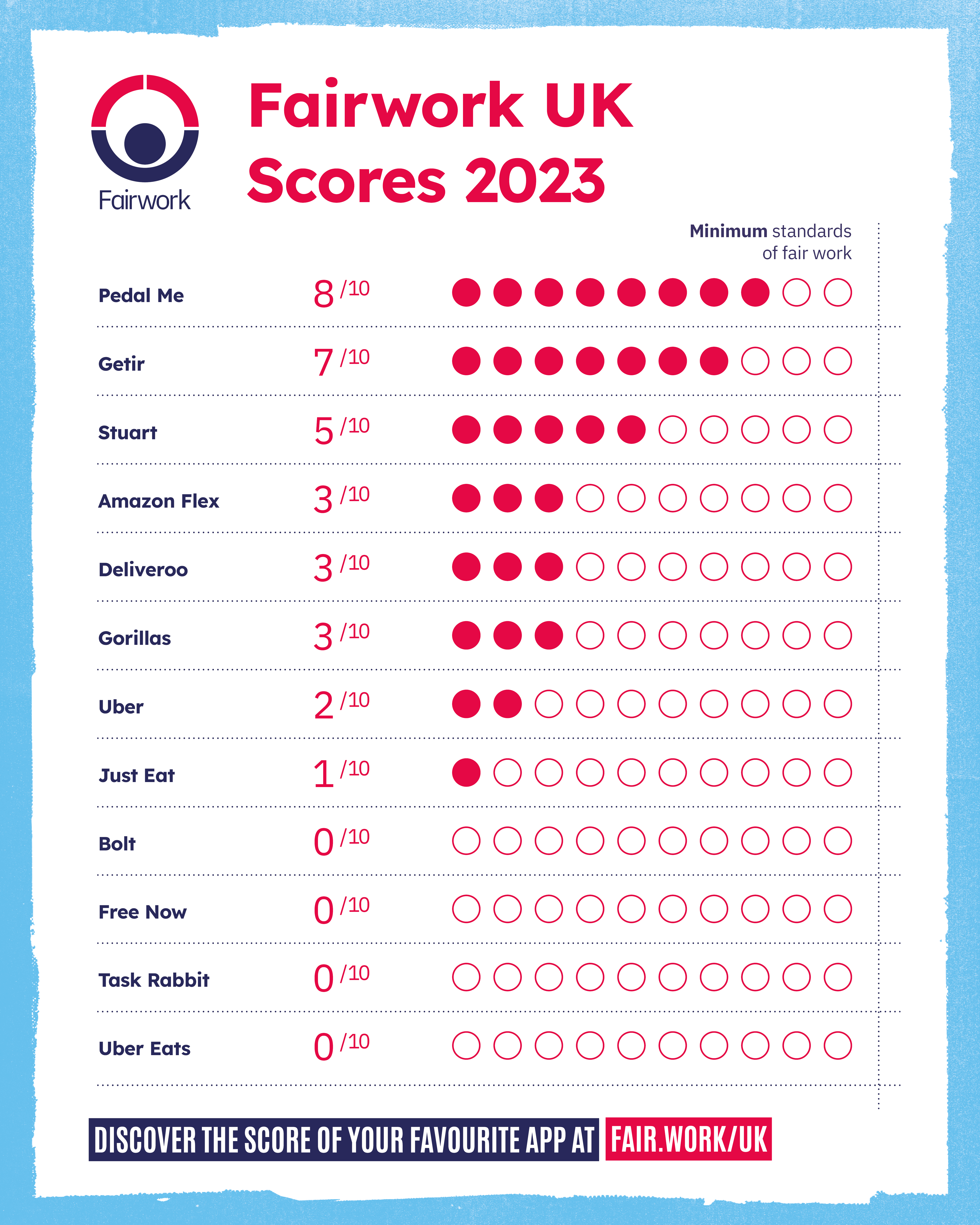This website uses cookies so that we can provide you with the best user experience possible. Cookie information is stored in your browser and performs functions such as recognising you when you return to our website and helping our team to understand which sections of the website you find most interesting and useful.
New Fairwork UK report finds platforms still failing to provide minimum protections for gig workers as demand for services falls

For the third year, researchers based at the Oxford Internet Institute, part of the University of Oxford, highlight the best and worst companies in the UK platform economy according to how they treat their workers.
As the cost of daily essentials has risen and in-place hospitality has reopened, consumer demand for platform-mediated services like food delivery or ride-hailing has fallen. Rising inflation has also led investors to demand profitability from platform companies, leading in some cases to cuts on existing protections for workers.
How are platforms responding to this shift and where does it leave platform workers? This year’s Fairwork UK report ‘Fairwork UK Ratings 2023: A Call for Transparency’ evaluates working conditions at 12 of the most popular digital labour platforms in the country – Amazon Flex, Bolt, Deliveroo, Free Now, Getir, Gorillas, Just Eat, Pedal Me, Stuart, Task Rabbit, Uber, and Uber Eats – to find out.
Ratings
The report ranks platforms against five principles of fair work, giving each company a score out of ten. Pedal Me topped the ranking with a score of 8 out of 10, followed by Getir (7) and Stuart (5). The study found that most other companies, such as Deliveroo, Just Eat, and Uber, could not prove they meet basic standards of fair work – such as ensuring all workers earn above the national minimum wage. However, through dialogue with Fairwork, some platforms like Stuart or Getir have made changes to their policies and practices that will improve conditions for workers.
Research Lead Dr Adam Badger said: “2023 has been a challenging year for platform workers, with a depression in demand following the boom in work and tech financing during the pandemic. In many cases, workers have borne the brunt of this market uncertainty, with platforms outsourcing heavy risks onto their workforces. At a time of economic hardship for families across the UK, now more than ever people need work that is fair and decent. Our research demonstrates that most platforms are failing to ensure work that meets even basic criteria of fairness. We hope to work with workers, platforms and politicians in the year ahead to encourage positive change.”

Key findings
Fair Pay: Only 2 of the 12 platforms (Pedal Me and Getir) could prove their workers earn the minimum wage after costs.
Fair Conditions: 7 out of 12 platforms (Pedal Me, Getir, Stuart, Amazon Flex, Deliveroo, Gorillas, and Uber) provided evidence of sufficient protection from the task-related risks, such as safety equipment without cost, emergency response systems, and free insurance.
Fair Contracts: 7 out of 12 platforms (Pedal Me, Getir, Stuart, Deliveroo, Gorillas, Just Eat, and Amazon Flex) provided evidence of clear and accessible contracts or terms of service.
Fair Management: Only 3 out of 12 platforms (Pedal Me, Getir and Stuart) were able to demonstrate effective due process for appealing ratings and terminations. Whilst many of the platforms were able to evidence anti-discrimination statements, only these 3 could demonstratee meaningful ways how they were putting their policies into action.
Fair Representation: Only 2 platforms so far (Uber and Deliveroo) allow for collective representation of workers. At Pedal Me, the principle of voluntary recognition with the Independent Workers’ Union of Great Britain (IWGB) has been accepted and they are now negotiating its details.
A key theme of this year’s report is the increasing use of opaque algorithms and AI tools to surveil, control and discipline platform workers. Workers interviewed expressed how algorithmic opacity has been a key driver of instability, stress, and vulnerability:
“The problem with [the platform] is that they don’t post how much you’re gonna get before you accept it, which I think is really wrong… I think there’s a reason why they don’t tell you though — when you look at £3.30 for two and a half miles.”
Publishing this study, researchers from the University of Oxford are, once again, calling for stronger protections and more robust labour standards in the UK’s platform economy.
Co-author Dr Funda Ustek-Spilda said: “Workers need to be given meaningful tools to understand how algorithmic decisions are made, how they impact the work they do, and shape the opportunities they have. In the UK, we need effective trade unions to fight for workers’ rights, to improve conditions, and increase fairness and dignity at work.”
What can I do? Fairwork Pledge
As part of Fairwork’s commitment to making platforms accountable for their labour practices, we have launched the Fairwork Pledge. This pledge aims to encourage other organisations to support decent labour practices in the platform economy, guided by the five principles of fair work.
Organisations like universities, schools, businesses, investors and charities that make use of platform labour can make a difference by supporting platforms that offer better working conditions.
Organisations have the option to sign up to the Pledge as an official Fairwork Supporter or an official Fairwork Partner. Those signing up to be a Supporter must demonstrate their support for fairer platform work publicly and provide their staff with appropriate resources to make informed decisions about what platforms to use. Becoming a Fairwork Partner entails making a public commitment to implement changes in their own internal practices, such as committing to using better-rated platforms when there is a choice.
More than 40 organizations, including GIZ, Solidarity Center, Learning Lions, WZB Berlin Social Science Center, and FES, have already signed the pledge. Join them in demanding a fairer future of work!
